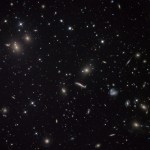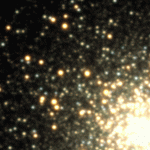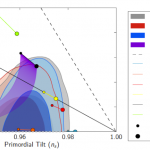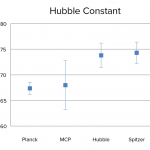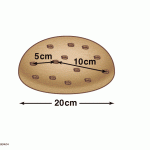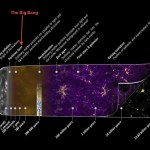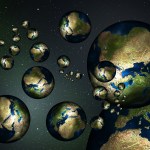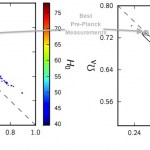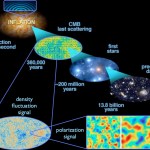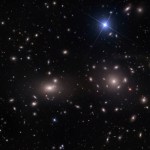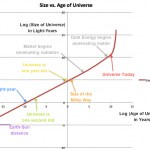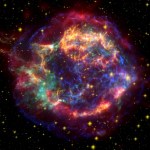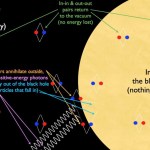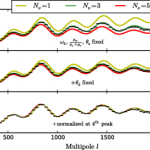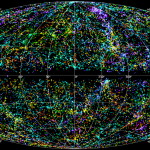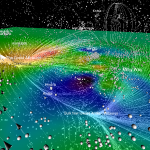Big Bang
"We've known for a long time that the universe is expanding. But about 15 years ago, my colleagues and I discovered that it is expanding faster and faster. That is, the universe is accelerating, and that was not expected, but it is now attributed to this mysterious stuff called dark energy which seems to make up about 70 percent of the universe." -Adam Riess
The Universe has been said to be not only stranger than we imagine, but stranger than we can imagine. After the discovery of the expanding Universe, scientists considered that there was a great cosmic race from the moment of the Big…
"Gamow was fantastic in his ideas. He was right, he was wrong. More often wrong than right. Always interesting; … and when his idea was not wrong it was not only right, it was new." -Edward Teller
There are few scientific idea more revered or more important than the Big Bang. For the vast majority of human history, we had nothing but wonder, stories, ideas and myths about where our Universe came from and how it got to be the way it is today. Thanks to the Big Bang -- and in particular, to the tremendous scientific achievements of the 20th century -- we now have bonafide scientific answers.…
"Nobody grows old merely by living a number of years. We grow old by deserting our ideals. Years may wrinkle the skin, but to give up enthusiasm wrinkles the soul." -Samuel Ullman
When it comes to the Universe, there are some dead giveaways as to what its age is. Its elemental composition changes, the types of stars that are present evolve, the large-scale structure visible to us morphs, grows and ceases, and the temperature of the cosmic microwave background drops, among many other signs.
Image credit: Suzuki et al. (The Supernova Cosmology Project), accepted for publication, Ap.J., 2011.,…
"Space is certainly something more complicated than the average person would probably realize. Space is not just an empty background in which things happen." -Alan Guth
If you go back in time, earlier and earlier, things get hotter, denser and more energetic. But there's a limit to how far back you can go, and that limit doesn't end in a singularity with the birth of time and space; instead, it ends with a period of cosmic inflation, which set up the hot Big Bang as we know it.
Image credit: National Science Foundation (NASA, JPL, Keck Foundation, Moore Foundation, related) — Funded BICEP2…
"That’s all regular matter, just five percent. A quarter is “dark matter,” which is invisible and detectable only by gravitational pull, and a whopping 70 percent of the universe is made up of “dark energy,” described as a cosmic antigravity, as yet totally unknowable. It’s basically all mystery out there - all of it, with just this one sliver of knowable, livable, finite light and life." -Summer Brennan
The Universe could have had any number of fates, even given that it started out with a hot Big Bang. Gravitation could have overcome the initial expansion, eventually causing a recollapse and…
"Mathematicians deal with possible worlds, with an infinite number of logically consistent systems. Observers explore the one particular world we inhabit. Between the two stands the theorist. He studies possible worlds but only those which are compatible with the information furnished by observers. In other words, theory attempts to segregate the minimum number of possible worlds which must include the actual world we inhabit." -Edwin Hubble
The combined work of many 20th century astronomers and physicists -- including Einstein, Slipher, Leavitt and Hubble -- led to the conclusion…
“These theories were based on the hypothesis that all the matter in the universe was created in one big bang at a particular time in the remote past.” -Fred Hoyle
It’s making headlines every time someone brings it up: a quantum calculation, a new theory or some mathematical evidence proves it once and for all: there was no Big Bang.
Image credit: NASA / STScI / A. Felid.
Is that even possible? Honestly, it depends on which definition of the Big Bang you’re using. As it turns out, there are two of them, and there’s a good (historical) reason for that. But in the context of what we…
“Our knowledge of physics only takes us back so far. Before this instant of cosmic time, all the laws of physics or chemistry are as evanescent as rings of smoke.” -Joe Silk
When people use the word theory colloquially, they use it to mean an "idea" or a "possibility" that could conceivably be at play. But a scientific theory has a much more stringent set of things it must accomplish: it must encompass all the successes of the previously leading theory, it must make successful predictions for phenomena that the leading theory cannot make, and it must predict additional, novel phenomena that…
"Any fool can criticize, condemn and complain - and most fools do." -Benjamin Franklin
The history of science is rife with stories of cases where a person or team, usually with a lot of clout, reached a conclusion that seemed incontrovertible. When that occurs, we often find that subsequent measurements agree with that conclusion, even if that conclusion later turns out to be wrong.
Recommended speed of light values over time. Adapted from Henrion & Fischhoff (1986).
This was the case for measurements of the speed of light and for the various masses of fundamental and…
"To know that we know what we know, and to know that we do not know what we do not know, that is true knowledge." -Nicolaus Copernicus
As we peel back the layers of information deeper and deeper into the Universe's history, we uncover progressively more knowledge about how everything we know today came to be. The discovery of distant galaxies and their redshifts led to expanding Universe, which led to the Big Bang and the discovery of very early phases like the cosmic microwave background and big bang nucleosynthesis.
After the Universe’s atoms become neutral, not only did the photons cease…
“The paradigm of physics — with its interplay of data, theory and prediction — is the most powerful in science.” -Geoffrey West
Cosmic inflation, our earliest theory of the Universe and the phenomenon that sets up the Big Bang, didn't just explain a number of puzzles, but made a slew of new predictions for the Universe. In the subsequent 35 years, five of the six have been confirmed, with only primordial gravitational waves left to go.
Image credit: NASA / WMAP science team.
Inflation predicts that they could be large or small, but based on the simplest classes of models and the measured…
"Gamow was fantastic in his ideas. He was right, he was wrong. More often wrong than right. Always interesting; … and when his idea was not wrong it was not only right, it was new." -Edward Teller
Considering what we know about our Universe today, it's hard to believe that just a century ago, Einstein's General Relativity was very much untested and uncertain, and we hadn't even realized that anything at all lie outside our own Milky Way. But over the past ten decades, ten great discoveries have taken place to give us the Universe we understand today.
Image credit: Adam Block/Mount…
"They say it all started out with a big bang. But, what I wonder is, was it a big bang or did it just seem big because there wasn't anything else drown it out at the time?" -Karl Pilkington
Looking out at the distant stars, galaxies and radiation in the Universe today, we've been able to determine not only what it's made out of, but how long it's been since the Big Bang: 13.8 billion years. Put all that information together, and you can also figure out how large the observable part of that Universe is today. From our point of view, it appears to extend for 46.1 billion light years in all…
"The two most common elements in the universe are hydrogen and stupidity." -Harlan Ellison
Shortly after the Big Bang, the Universe was filled with 99.99999993% hydrogen and helium, with the rest being lithium. But stars change everything, by fusing those elements -- the lightest ones -- into heavier ones, climbing the periodic table and enriching the Universe with its contents.
Image credit: NASA / JPL-Caltech.
After billions of years of star formation and nuclear fusion, a new 3rd most common element has emerged, and it isn’t carbon — formed from helium fusion — which only clocks in at…
"In theory, there's no difference between theory and practice. In practice, there is." -Yogi Berra
Scientific theories are a dime a dozen, yet only the most successful have a large range of validity, hold up to many disparate lines of evidence, and stand the test of time. Inevitably, our explorations go beyond that range of validity, and a new theory must come along to supersede them.
Image credit: NASA / STScI / A. Felid.
But does that invalidate the old theory? And does that mean it would be irresponsible to bet your life that the idea you're working on is correct? While no theory can…
“In science it often happens that scientists say, ‘You know that’s a really good argument; my position is mistaken,’ and then they would actually change their minds and you never hear that old view from them again. They really do it. It doesn’t happen as often as it should, because scientists are human and change is sometimes painful. But it happens every day. I cannot recall the last time something like that happened in politics or religion.” -Carl Sagan
So, Ben Carson made a speech in 2011 that's making the rounds, for some pretty scary reasons. I'm particularly concerned with what he has…
“I was strongly encouraged by a science teacher who took an interest in me and presented me with a key to the laboratory to allow me to work whenever I wanted.” -Frederick Reines, discoverer of the first neutrino
That kind of education is irreplaceable, and at Starts With A Bang we do our best to bring the stories, knowledge and wonder of the Universe to everyone. Here's a look back at what we hit on this past week:
Have we solved the black hole information paradox? (for Ask Ethan),
The ultimate superhero cake (for our Weekend Diversion),
See inside the swirling storms of…
“When you see how fragile and delicate life can be, all else fades into the background.” -Jenna Morasca
The hot Big Bang -- proposed seventy years ago -- is a tremendous success story. Predicated on the assumption that the Universe was hotter, denser, more uniform and expanding faster in the past, it's allowed us to predict the rate of cosmic expansion over distance and time, the primeval abundances of the light elements, the formation and evolution of large-scale-structure, and the existence and properties of the cosmic microwave background: the leftover photon glow from the Big Bang.
Image…
When it comes to the Universe, physicists say things like: it originated in a Big Bang, it's isotropic (or the same in all directions), and it's homogeneous (the same everywhere), save for the effects of cosmic evolution. In every direction we look, we see galaxies expanding away from us, with the expansion rate increasing the farther away we look.
Image credit: NASA / WMAP science team, via http://map.gsfc.nasa.gov/universe/bb_tests_exp.html.
But an expansion inherent to the fabric of space itself isn't the only explanation; it's conceivable that we see what we see because everything…
“The slow philosophy is not about doing everything in tortoise mode. It’s less about the speed and more about investing the right amount of time and attention in the problem so you solve it.” -Carl Honore
If you wanted to know how fast you were moving through space, you'd need to measure it all: the Earth's rotation, our motion around the Sun, the Sun's motion through the galaxy, the Milky Way's speed within the local group, and finally how the local group moved relative to the Universe. All in all, it's a daunting, virtually impossible task without literally measuring everything in the…
